【中考考点清单】2014年中考英语(湖南专用 新课标)总复习课件:第一部分 教材知识梳理 七年级(上)Unit 1(含中考试题示例)
文档属性
| 名称 | 【中考考点清单】2014年中考英语(湖南专用 新课标)总复习课件:第一部分 教材知识梳理 七年级(上)Unit 1(含中考试题示例) |
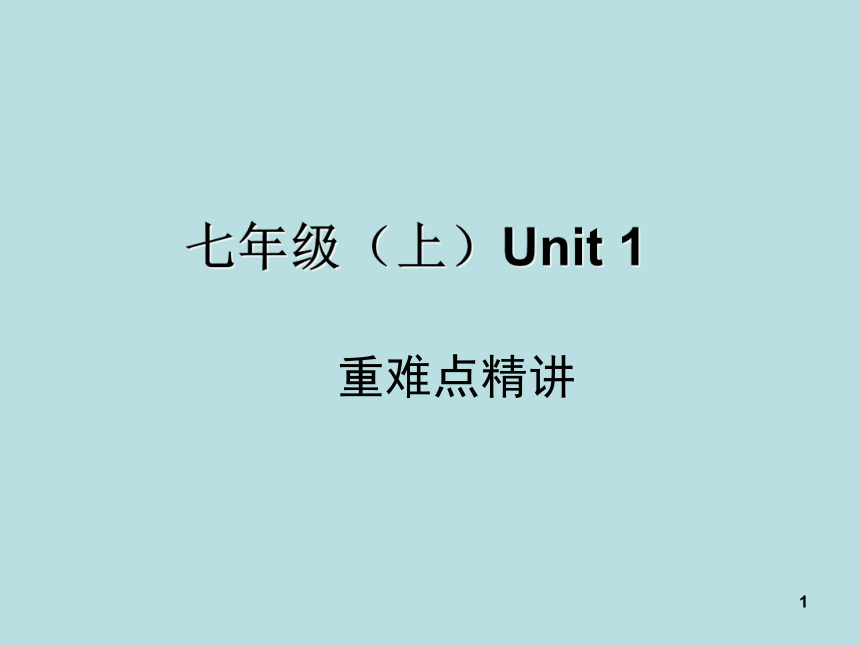
|
|
| 格式 | zip | ||
| 文件大小 | 281.2KB | ||
| 资源类型 | 教案 | ||
| 版本资源 | 通用版 | ||
| 科目 | 英语 | ||
| 更新时间 | 2014-01-21 00:00:00 | ||
图片预览

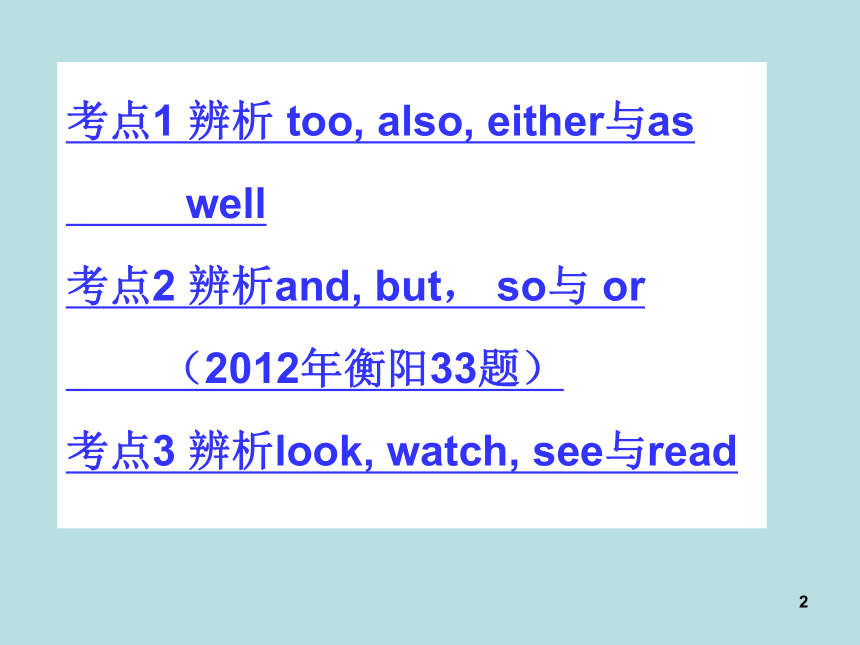
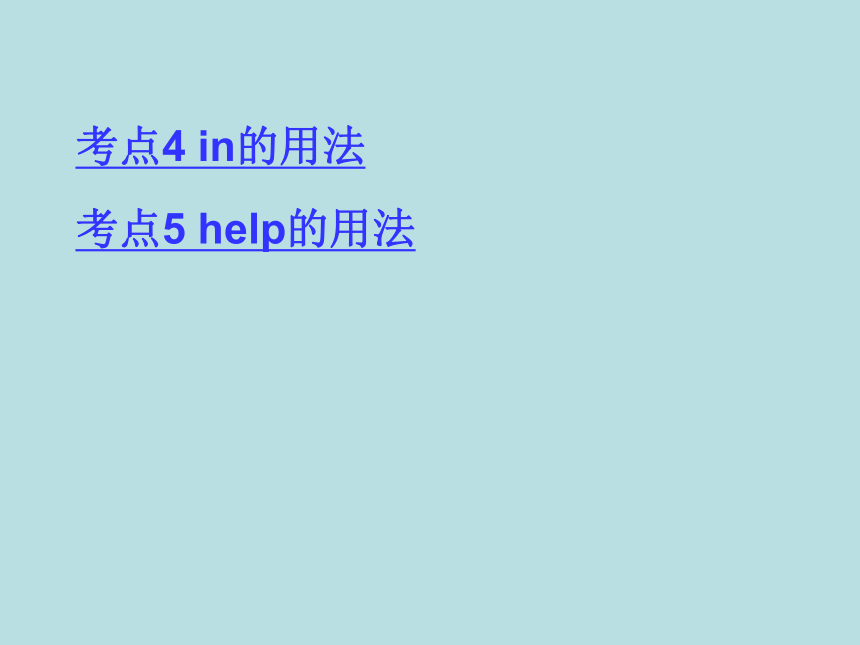
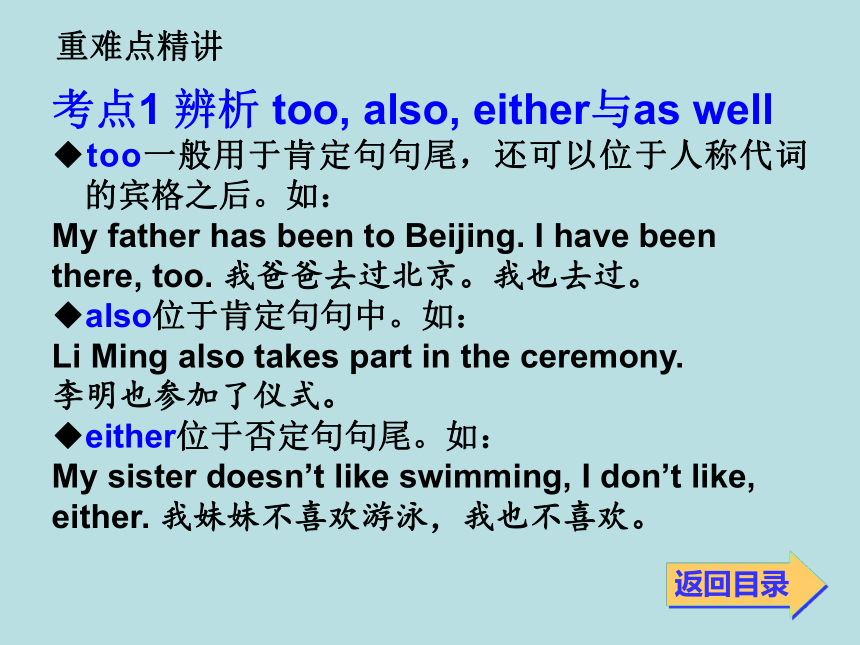
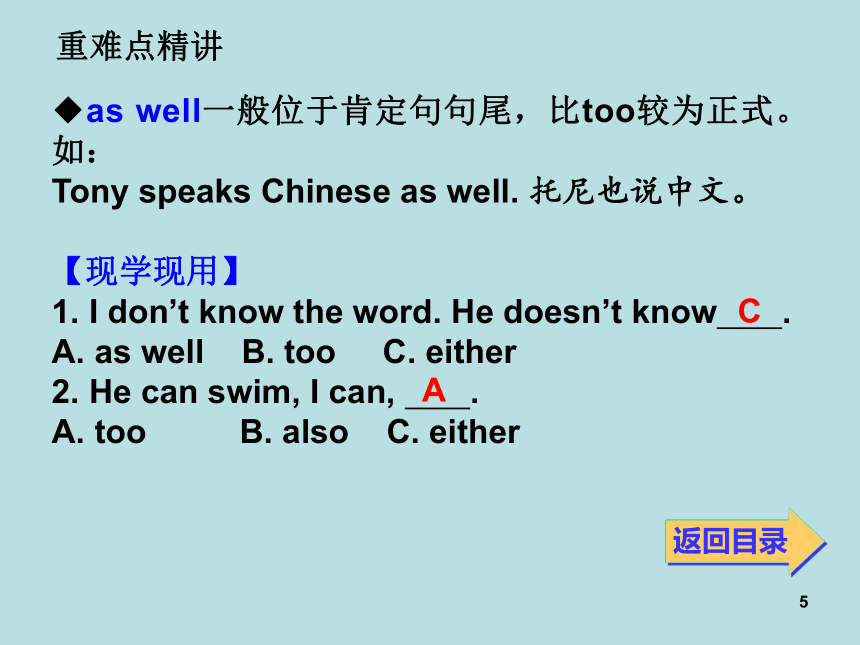
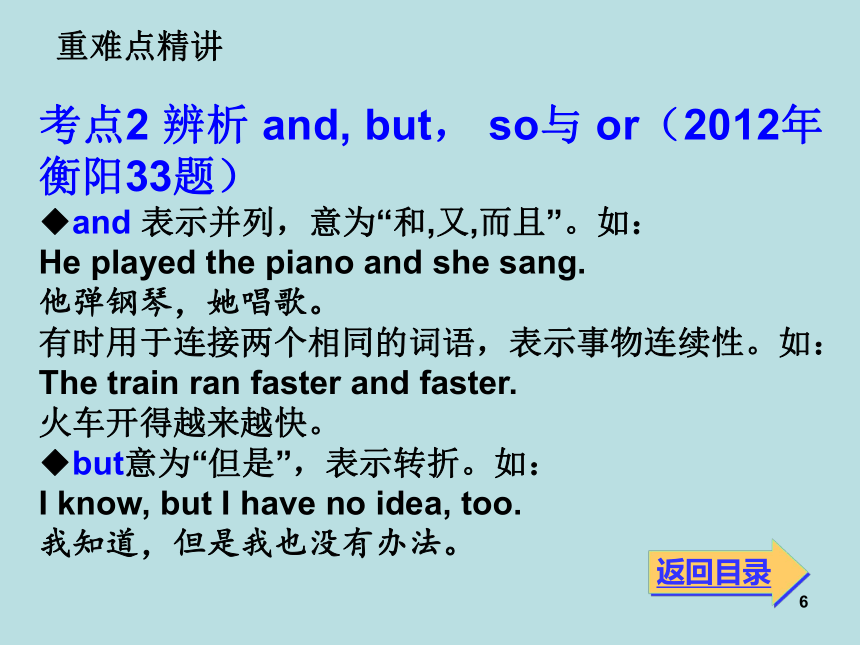
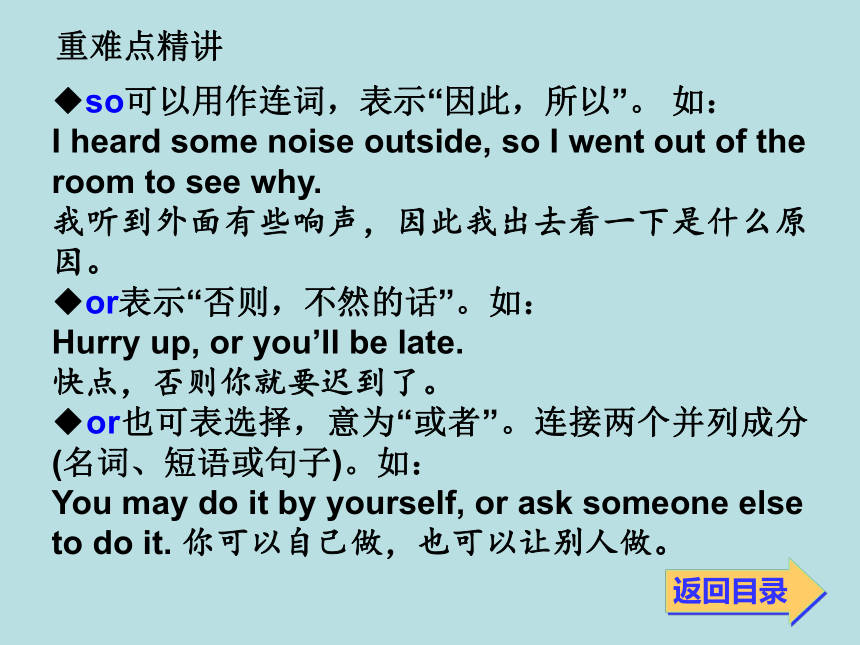
文档简介
课件16张PPT。1
重难点精讲 七年级(上)Unit 12
考点1 辨析 too, also, either与as
well
考点2 辨析and, but, so与 or
(2012年衡阳33题)
考点3 辨析look, watch, see与read
考点4 in的用法
考点5 help的用法
4考点1 辨析 too, also, either与as well
◆too一般用于肯定句句尾,还可以位于人称代词的宾格之后。如:
My father has been to Beijing. I have been
there, too. 我爸爸去过北京。我也去过。
◆also位于肯定句句中。如:
Li Ming also takes part in the ceremony.
李明也参加了仪式。
◆either位于否定句句尾。如:
My sister doesn’t like swimming, I don’t like,
either. 我妹妹不喜欢游泳,我也不喜欢。
重难点精讲返回目录5◆as well一般位于肯定句句尾,比too较为正式。如:
Tony speaks Chinese as well. 托尼也说中文。
【现学现用】
1. I don’t know the word. He doesn’t know .
A. as well B. too C. either
2. He can swim, I can, .
A. too B. also C. either
返回目录重难点精讲CA6考点2 辨析 and, but, so与 or(2012年衡阳33题)
◆and 表示并列,意为“和,又,而且”。如:
He played the piano and she sang.
他弹钢琴,她唱歌。
有时用于连接两个相同的词语,表示事物连续性。如:
The train ran faster and faster.
火车开得越来越快。
◆but意为“但是”,表示转折。如:
I know, but I have no idea, too.
我知道,但是我也没有办法。
重难点精讲返回目录7◆so可以用作连词,表示“因此,所以”。 如:
I heard some noise outside, so I went out of the room to see why.
我听到外面有些响声,因此我出去看一下是什么原因。
◆or表示“否则,不然的话”。如:
Hurry up, or you’ll be late.
快点,否则你就要迟到了。
◆or也可表选择,意为“或者”。连接两个并列成分 (名词、短语或句子)。如:
You may do it by yourself, or ask someone else to do it. 你可以自己做,也可以让别人做。
返回目录重难点精讲8
【现学现用】
3. (’12衡阳33题)Hurry up, ____we’ll be late.
A. or B. and C. but
4. He likes pop music, ____his wife likes rock music.
A. but B. and C. or
5. I didn’t hand in my homework on time, ____ my teacher was very angry.
A. and B. but C. so
返回目录重难点精讲CAA9考点3 辨析look, watch, see与read
◆look作动词,指集中注意力看,强调“看”的动作,可单独成句;后接宾语时加介词at;作系动词表示“看起来”,后接形容词作表语。
The picture looks nice. 这幅图看起来很漂亮。
◆watch强调“(聚精会神地)看;注视”;常用于表示“看电视/看比赛/……”。
Don’t make noise. My father is watching the basketball match. 不要吵,我爸爸正在看篮球赛。
◆see强调“看”的结果;常用于表示“看电影/看病/……”;也可表示“理解;考虑”。
返回目录重难点精讲10Can you see the words on the blackboard clearly?你能看清楚黑板上的字吗?
◆read通常用来表达“看书,看报,看信,看杂志”等。如:
Don’t read in bed. 别躺在床上看书。
返回目录重难点精讲12
【现学现用】
6. Mr. Green is ____TV at this time.
A. seeing B. watching C. reading
7. Please ____at the blackboard carefully, boys and girls.
A. see B. look C. watch
返回目录重难点精讲BB13考点4 in的用法
◆在……里。如:
There are five people in the room.
房间里有五个人。
◆用……(语言)。如:
They talked in English. 他们用英语交谈。
◆在;于(年、月等时间)。如:
She moved to Beijing in 2006.
她2006年搬到了北京。
◆穿;戴。如:
The policeman in uniform is my uncle.
穿着制服的那个警察是我的叔叔。
返回目录重难点精讲14◆在……(时间)之后,用于将来时。如:
She will be back in five days. 她五天后回来。
【现学现用】
8. This book is not mine. Mine is ____my schoolbag.
A. in B. on C. at
9. Can you speak it ____English?
A. in B. with C. by
重难点精讲AA返回目录15考点5 help的用法
◆help 动词,意为“帮助”。关于help的句型有:
help sb. (to) do sth.帮助某人做某事
help sb. with sth.帮助某人某事
He often helps me clean the room.
他经常帮我打扫房间。
◆helpful 形容词,意为“有帮助的”。
This book is very helpful for me.
这本书对我很有帮助。
重难点精讲返回目录16【现学现用】
10. Could you help me ____my English?
A. with B. learning C. learn to
11. She encouraged me to study hard. Her words was very ____for my success.
A. helpful B. good C. efficient
重难点精讲AA返回目录
重难点精讲 七年级(上)Unit 12
考点1 辨析 too, also, either与as
well
考点2 辨析and, but, so与 or
(2012年衡阳33题)
考点3 辨析look, watch, see与read
考点4 in的用法
考点5 help的用法
4考点1 辨析 too, also, either与as well
◆too一般用于肯定句句尾,还可以位于人称代词的宾格之后。如:
My father has been to Beijing. I have been
there, too. 我爸爸去过北京。我也去过。
◆also位于肯定句句中。如:
Li Ming also takes part in the ceremony.
李明也参加了仪式。
◆either位于否定句句尾。如:
My sister doesn’t like swimming, I don’t like,
either. 我妹妹不喜欢游泳,我也不喜欢。
重难点精讲返回目录5◆as well一般位于肯定句句尾,比too较为正式。如:
Tony speaks Chinese as well. 托尼也说中文。
【现学现用】
1. I don’t know the word. He doesn’t know .
A. as well B. too C. either
2. He can swim, I can, .
A. too B. also C. either
返回目录重难点精讲CA6考点2 辨析 and, but, so与 or(2012年衡阳33题)
◆and 表示并列,意为“和,又,而且”。如:
He played the piano and she sang.
他弹钢琴,她唱歌。
有时用于连接两个相同的词语,表示事物连续性。如:
The train ran faster and faster.
火车开得越来越快。
◆but意为“但是”,表示转折。如:
I know, but I have no idea, too.
我知道,但是我也没有办法。
重难点精讲返回目录7◆so可以用作连词,表示“因此,所以”。 如:
I heard some noise outside, so I went out of the room to see why.
我听到外面有些响声,因此我出去看一下是什么原因。
◆or表示“否则,不然的话”。如:
Hurry up, or you’ll be late.
快点,否则你就要迟到了。
◆or也可表选择,意为“或者”。连接两个并列成分 (名词、短语或句子)。如:
You may do it by yourself, or ask someone else to do it. 你可以自己做,也可以让别人做。
返回目录重难点精讲8
【现学现用】
3. (’12衡阳33题)Hurry up, ____we’ll be late.
A. or B. and C. but
4. He likes pop music, ____his wife likes rock music.
A. but B. and C. or
5. I didn’t hand in my homework on time, ____ my teacher was very angry.
A. and B. but C. so
返回目录重难点精讲CAA9考点3 辨析look, watch, see与read
◆look作动词,指集中注意力看,强调“看”的动作,可单独成句;后接宾语时加介词at;作系动词表示“看起来”,后接形容词作表语。
The picture looks nice. 这幅图看起来很漂亮。
◆watch强调“(聚精会神地)看;注视”;常用于表示“看电视/看比赛/……”。
Don’t make noise. My father is watching the basketball match. 不要吵,我爸爸正在看篮球赛。
◆see强调“看”的结果;常用于表示“看电影/看病/……”;也可表示“理解;考虑”。
返回目录重难点精讲10Can you see the words on the blackboard clearly?你能看清楚黑板上的字吗?
◆read通常用来表达“看书,看报,看信,看杂志”等。如:
Don’t read in bed. 别躺在床上看书。
返回目录重难点精讲12
【现学现用】
6. Mr. Green is ____TV at this time.
A. seeing B. watching C. reading
7. Please ____at the blackboard carefully, boys and girls.
A. see B. look C. watch
返回目录重难点精讲BB13考点4 in的用法
◆在……里。如:
There are five people in the room.
房间里有五个人。
◆用……(语言)。如:
They talked in English. 他们用英语交谈。
◆在;于(年、月等时间)。如:
She moved to Beijing in 2006.
她2006年搬到了北京。
◆穿;戴。如:
The policeman in uniform is my uncle.
穿着制服的那个警察是我的叔叔。
返回目录重难点精讲14◆在……(时间)之后,用于将来时。如:
She will be back in five days. 她五天后回来。
【现学现用】
8. This book is not mine. Mine is ____my schoolbag.
A. in B. on C. at
9. Can you speak it ____English?
A. in B. with C. by
重难点精讲AA返回目录15考点5 help的用法
◆help 动词,意为“帮助”。关于help的句型有:
help sb. (to) do sth.帮助某人做某事
help sb. with sth.帮助某人某事
He often helps me clean the room.
他经常帮我打扫房间。
◆helpful 形容词,意为“有帮助的”。
This book is very helpful for me.
这本书对我很有帮助。
重难点精讲返回目录16【现学现用】
10. Could you help me ____my English?
A. with B. learning C. learn to
11. She encouraged me to study hard. Her words was very ____for my success.
A. helpful B. good C. efficient
重难点精讲AA返回目录
